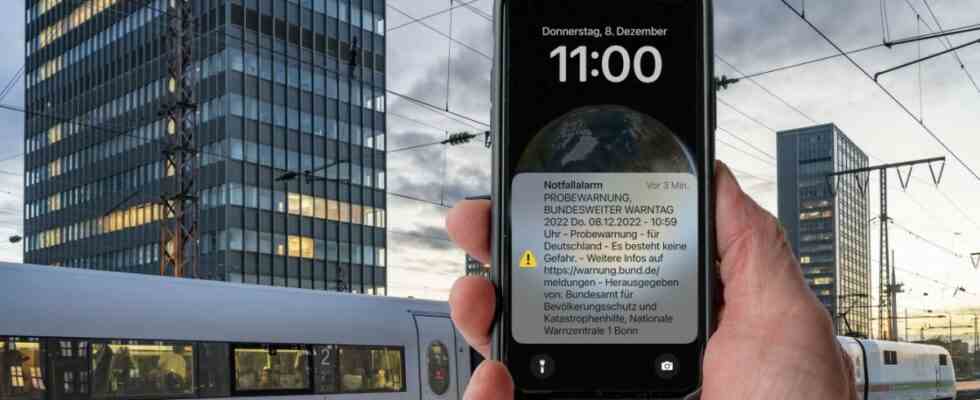On Thursday at eleven o’clock as many people as possible in Germany should be startled: howling sirens, loudspeaker announcements, messages in trains and on city advertisements as well as on radio and television stations. But above all: mobile phones vibrating, accompanied by a loud sound signal.
That’s the theory. In reality, however, very many people were not reached. For the first time, the Office for Civil Protection and Disaster Relief (BBK) had spread its warning with cell broadcast via mobile phones. A technology with which mobile phone users can be alerted without an app or the Internet. But the BBK had to announce in advance that older devices cannot receive the warnings at all. In addition, mobile phones had to be switched on, have reception and run with up-to-date software.
And something else didn’t go well. Because the test alert was sent at the highest alert level, it should have arrived on devices that block test alerts by default. Apparently, some operational devices did not receive a warning message either.
After all: Citizens who were not warned can share their experiences, whether praise or anger, with the BBK on the website since Thursday morning warntag-umfrage.de describe. Such feedback is important for the authority, after all, the federal and state governments have tested for the event of a disaster. They wanted to find out whether the various warning devices work well in an emergency, whether there is a problem somewhere and how many people receive the danger warning in the event of a disaster. In addition, the population should be made aware of the various alarm routes.
Faeser: Now it’s being evaluated carefully
On this second nationwide warning day, everything was supposed to run better than two years earlier, when sirens sounded the alarm belatedly, warning apps did not report or responded much too late due to overloaded servers. The Federal Ministry of the Interior had to classify the day as a failure, and the BBK President at the time lost his job. From then on, the warning day was to take place every year, but it was canceled in 2021 because the BBK did not feel well prepared.
According to authorities and experts, the second attempt on Thursday went much better. The interaction of the individual systems worked, said BBK President Ralph Tiesler on Thursday afternoon. However, he acknowledged “need for improvement in one place or another”. Federal Minister of the Interior Nancy Faeser explained how well the warning systems worked and are now being carefully evaluated.
The fact that more people were reached this year was mainly due to Cell Broadcast. With the introduction of the system, the federal government learned a lesson from the flood disaster of 2021, when many people in North Rhine-Westphalia and Rhineland-Palatinate were not warned in good time of the life-threatening flood. However, other countries have been using cell broadcast successfully for years. The mobile network operator Telefonica said that the delivery “worked as planned” and Vodafone also speaks of a success.
Emergency calls were received in the Cologne fire brigade
Apparently, a lot of people didn’t know that a test was coming their way. The control center of the Cologne fire brigade received emergency calls from concerned citizens who did not know how to react to the mobile phone warning. The alarm apparently also triggered uncertainty among some people who did not speak German, who could not work out why a German message suddenly appeared on their cell phones. Cell broadcast is sent indiscriminately to all people who are logged into mobile phone networks in Germany. According to a BBK spokeswoman, the message should actually be sent in English to people who use a non-German language setting. But this worked only partially.
In addition, some users reported on social media that the warning apps Nina and Katwarn sometimes reacted late or they had to open the app separately. The company Combirisk, which is responsible for Katwarn, was “very satisfied” overall after the test alarm, and most notifications arrived punctually at just after eleven, as a spokesman said.
The largest construction site was revealed at the siren network. True, residents in most communities with sirens heard a loud howling sound. According to the interior authorities in Hamburg, all 123 sirens in the city area triggered a test alarm. In Berlin, on the other hand, the sirens could not be activated because the technical connection to the warning system was not yet working. And many other cities only have a few sirens or, like Munich, no sirens at all because they were dismantled after the end of the Cold War. Although the federal government is providing local authorities with around 90 million euros for the purchase of new sirens this year, this is only a fraction of the funds required. Some cities, such as Heidelberg or Freiburg im Breisgau, deliberately chose not to take part in the warning day. This was voluntary.

